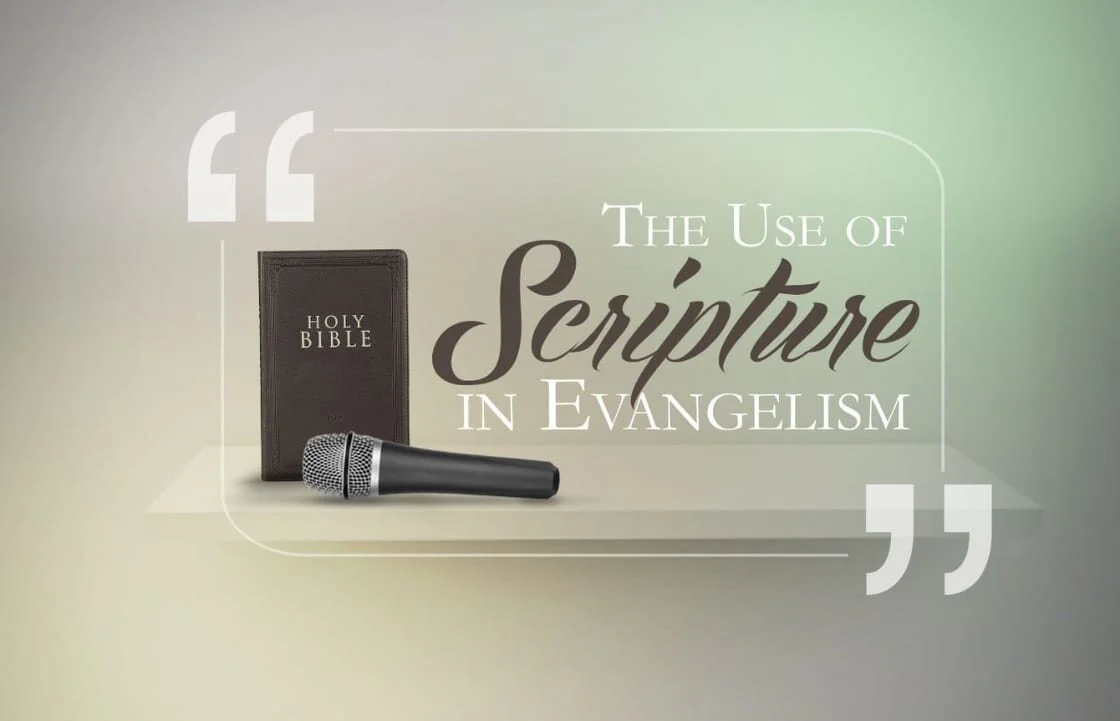The Use of Scripture in Evangelism.
“You can’t use the Bible when it comes to sharing with non-Christians as they don’t accept its truth claims. All you can do is find common ground, perhaps a movie or other cultural connection, then use that to introduce people to Jesus.”
I sat silently in my chair resisting the urge to interrupt the speaker who was conducting an evangelism training seminar for local churches. This man is well known to me, and I consider him a brother. He has a passion for Jesus and wants the lost to come to know Christ, but by the comment he just made, he actually revealed a lack of trust in the authority and sufficiency of Scripture. In his mind, the effectiveness of our outreach was to be determined by if someone believed the Bible or not.
After the seminar was over, I started to chat to the speaker about the comments he made. I said to him, “If I go to war it doesn’t matter if the enemy believes in my rifle or not. He could deny the usefulness of my ammunition, and he could claim that he doesn’t accept the fact that my weapon can harm him. However, that belief won’t stop me shooting him.” The point I was seeking to drive home was that the effectiveness of the Scripture in evangelism is not determined by the belief of the individual to whom we are witnessing. God’s Word is powerful and works even in the heart of those who may say they don’t believe.
The danger we face in removing Scripture from evangelism is that we actually take away the means that God has chosen to create faith in the heart of the non-believer. In Romans 10:17 we read, “So then faith comes by hearing, and hearing by the word of God.” This truth flows on from a section of Scripture which seeks to tell people how they can become Christians (Romans 10:9,13). The connection the Apostle Paul is seeking to make is that if we want people to be truly converted to Christ, then we need to use the means that God has ordained to bring about saving faith – the Word of God.
In all our witnessing encounters, from one to one conversations through to preaching to packed out stadiums, we need to ensure that God’s Word is central. It is only the Scripture that makes people wise for salvation (2 Timothy 3:15) and it is only the Bible which testifies of Jesus (John 5:39). We must resist the urge to engage in evangelism without the Scripture. When we witness to someone, we want them to hear God speak. We want people to hear the voice of their Creator revealing who He is to them, and the only way this can be achieved is by the Bible being used.
But what does this look like practically? I don’t think we need to go around quoting verbatim from the Scripture (though there is nothing wrong with that), but rather when we share the gospel we should be seeking to draw the attention of the person we are speaking to back to the authority of God’s Word. This can be done by giving the sense of the text and simply referencing the Bible; it can also be done by giving away copies of the Scripture.
In our culture there is a lack of Scriptural understanding, so giving away copies of God’s Word is a very good and practical thing we can do. I personally know of several people who were converted through simply reading the Bible. The more Scripture we can get into the public arena the better, as God has chosen to use His Word to transform people and nations.
Let me conclude by giving some suggestions on how we can give away God’s Word.
1) Give away Gospels: Something I try to do is carry at least one copy of the Gospel of John in my pocket. As I go about each day, I look for opportunities to give away this portion of God’s Word. Individual copies of the Gospel aren’t expensive, so this is a cost-effective means of evangelism. I would recommend the Gospels produced by the Pocket Testament League (they have branches in several countries). You can also purchase different editions and translations of the Gospels from most Christian bookstores.
2) Literature Table: In both Australia and the UK, I have used “Free Bible and Literature” tables in public places. This outreach does cost money to set up (buying resources etc.), but it has proven to be very effective in reaching people. On the table we will have copies of either the Gospel or full Bibles, along with other Christian booklets which cover apologetic issues and topics which people are interested in. It is also worth having material for children on the table, this could be a tract aimed at kids, however, I prefer to have a Scripture colouring book for children to take home. Should you use a literature table, then my recommendation would be don’t stand around the table, rather set it up, then stand a short distance away handing out tracts. This allows people to browse the literature without feeling like you are trying to sell them something.
3) Social Media: When the COVID-19 lockdown started in England, I used the church social media page to offer free copies of the Bible to people in our community. I also shared the offer in different Facebook community groups. We had a number of people contact us asking for a Bible, which we were able to post to them. The added benefit with social media is that you also create an online connection between the unbeliever and your home church. We found this connection created many gospel conversations.
These are only three ideas which you can use to help spread the Word of God in your community. Look for different ways to share Scriptures, as it is through the Bible that God works faith in the heart of sinners.
Keep Making Much of Jesus!


